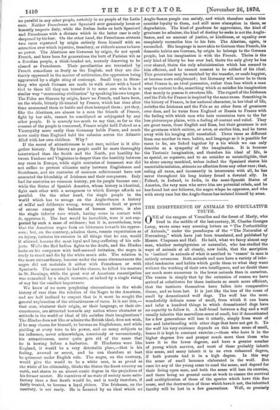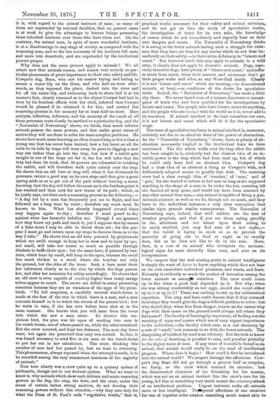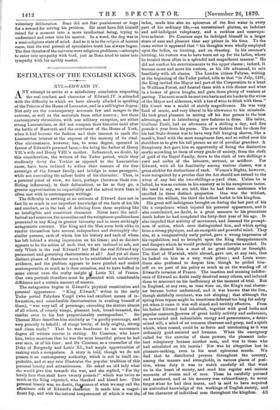THE INDIFFERENCE OF ANIMALS TO SPECULATIVE TRUTH.
ONE of the rangers of Versailles and the forest of Marly, who lived in the middle of the last century, M. Charles Georges Leroy, wrote some very amusing letters on "The Perfectibility of Animals," under the pseudonym of the "The Naturalist of Nuremberg," which have just been translated, and published by Messrs. Chapman and Hall. He held, what we fancy almost any man, whether metaphysician or naturalist, who has studied the ways of animals at all closely, now holds, that the ascription to instinct' in animals of what is ascribed to 'reason' in man is entirely erroneous. Both animals and men have a variety of inhe- rited tendencies and habits which guide them to what they want without the working of their own intelligence, and no doubt these are much more numerous in the lower animals than in ourselves. The reason is simply that by the extension of reason we have arrived at substitutes for these instincts so much more efficient, that the instincts themselves have fallen into comparative disuse, and so been lost. It is just like the loss of the sense of smell by domesticated wolf dogs. The wolf has the most wonderfully delicate sense of smell, from which it can learn and infer a hundred things in which domesticated dogs have no capacity to follow it. A half-breed between a dog and a wolf usually inherits this marvellous sense of smell, but if domesticated for a few generations will lose it utterly, simply from want of use and interbreeding with other dogs that have not got it. To the wolf his very existence depends on this keen sense of smell, hence it is kept in constant exercise ;—those who have it in the higher degrees live and prosper much more than those who have it in the lower degrees, and have a greater number of young which survive, and most of these probably inherit this sense, and many inherit it in an even enhanced • degree, if both parents had it in a high degree. In this way the sense of smell becomes elaborated in the wolf. But once let any of the young cease to need the sense, and depend for their living upon man, and both the sense will lose its exercise, and there being no general cause at work to ensure the survival and multiplication of those of the species which have this fine sense, and the destruction of those which have it not, the inherited faculty will be lost in a few generations. Well, so precisely
it is, with regard to the animal instincts of man ; so many of them are superseded by rational faculties, that no general cause is at work to give the advantage to human beings possessing these inherited instincts over those who have them not. On the contrary, the animal man, in spite of more wonderful instincts, is at a disadvantage in any stage of society as compared with the reasoning man, and so the less necessary of his instincts fall more and more into desuetude, and are superseded by the intellectual powers proper.
Why doesnot the same process apply to animals ? We all admit now that animals reason, and reason very acutely on par- ticular phenomena of great importance to their own safety and life. Cowper's dog, Beau, who saw his master trying and failing to secure a water-lily on the Ouse, and who half-an-hour after- wards, as they repassed the place, dashed into the river and bit off the water-lily, and swimming back to shore laid it at his master's feet, clearly reasoned as to the object Cowper had had in view by his fruitless efforts with the stick, inferred that Cowper would be pleased if he obtained it for him, and carried this reasoning process in his memory for at least half-an-hour. Here analysis, reflection, inference, and the memory of the result of all these processes must clearly be ascribed to a particular dog, and the "Naturalist of Nuremberg" shows, we think, that much inferior animals possess the same powers, and that under great stress of motive they will use them to solve far more complex problems. He shows how much more knowing an often-hunted stag or fox is than a young one that has never been hunted, how a fox beset on all the exits to its hole by traps will wear away its paws in digging a new way out rather than go into the trap, but how if a rabbit gets caught in one of the traps set for it, the fox will infer that the trap has done its work, that its powers are exhausted in catching the rabbit, and will therefore walk quite calmly over the trap. He shows that an old hare or stag will, when it has distanced its pursuers, return a good way on its own steps and then give a great spring aside so as to get out of the path without leaving a scent, knowing that the dog will follow the scent up to the furthest point it has reached and then seek for new traces of its path ; which, as he justly says, involves such a reasoning process as the following :— " A dog led by a man has frequently put me to flight, and has followed me a long time by scent ; therefore my scent must be known to him. What has already happened several times may happen again to-day; therefore I must guard to-day against what has formerly befallen me. Though I am ignorant how they know my path and track it, yet I suppose that by means of a false scent I may be able to throw them out ; for this pur- pose I must go and return upon my steps to deceive them as to the way I take." He shows that an old hare pursued by greyhounds which are swift enough to keep her in view and to hunt by eye, not smell, will take her course as much as possible through thickets to baffle their eyes ; but the same hare, if pursued by har- riers, which hunt by smell, will keep to the open, because the smell lies much thicker in a wood, where she touches not only the ground, but the sides of the trees. Such a hare must draw her inferences clearly as to the clue by which the dogs pursue her, and alter her measures for safety accordingly. Re shows that an old crow is even capable of counting higher than many savage tribes appear to count. The crows are killed in many preserving countries because they are so voracious of the eggs of the game- birds. "To lull suspicion, a carefully covered watch-house is made at the foot of the tree in which there is a neat, and a man conceals himself in it to watch the return of the parent bird ; but he waits in vain, if she has ever before been shot at in the same manner. She knows that you will issue from the cover into which she saw a man enter. To deceive this sus- picious bird, the plan was hit upon of sending two men to the watch-house, one of whom passed on, while the other remained. But the crow counted, and kept her distance. The next day three went, but again she perceived that only two retired. In fine, it was found necessary to send five or six men to the watch-house to put her out in her calculation. The crow, thinking this number of men had but passed by, lost no time in returning. This phenomenon, always repeated when the attempt is made, is to be recorded among the very commonest instances of the sagacity of animals."
Now here clearly was a crow quite up to a quinary system of arithmetic, though not to our decimal system. What we want to know is, why animals which show such delicate and acute reasoning powers as the dog, the stag, the hare, and the crow, under the stress of certain rather strong motives, do not develop their reasoning powers without this stimulus,—why they care only for what the Dean of St. Paul's calls "regulative truths," that is,
practical truths necessary for their safety and animal salvation, and do not get on into the study of speculative truths, the investigation of truth for its own sake, the knowledge of causes which do not immediately and urgently bear on their own dangers and wants. The Naturalist of Nuremberg thinks it is owing to the lower animals having such a struggle for exist- ence that they have no time for any truths which do not bear im- mediately on their safety,—to their entire deficiency in "leisure and ennui." But however much this may apply to animals in a wild state, it clearly does not apply to domestic animals. Dogs, espe- cially favourite dogs, have plenty of" leisure and ennui," and suffer as much from ennui, when their masters and mistresses 'don't go their proper walks and rides, as any \Vest-End dandy, Clearly it is not 'leisure and ennui' which are wanting,—to domesticated animals, at least,—as conditions of the desire for speculative truth. Indeed, the "Naturalist of Nuremberg" has made a little slip there. We never heard even of a human discoverer or investi- gator of truth who had been qualified for his investigations by leisure and ennui. The people who have leisure, never do anything, and the people who are ennuye's with the world as it is, never add to. its resources. If animal intellect in the least resembles our own, it is not leisure and ennui which will fit it for the speculative stage.
The want of speculative tendency in animal intellect is, moreover, certainly not due to an absolute want of the power of abstraction. As the "Naturalist of Nuremberg" shows, there is plenty of ab- straction necessarily implied in the intellectual feats we have mentioned. The fox which walks over the trap after the rabbit. has been caught in it, evidently had the clearest idea of an in- visible power in the trap wffich had been used up, but of which he could only have had an abstract idea. Cowper's dog had a clear idea of as abstract a thing as Cowper's wish, and deliberately adopted means to gratify that wish. The counting crow had a clear enough idea of 'number,' of 'man,' and of 'gun,' for she waited to return to her nest as long as she supposed anything in the shape of a man to be under the hut, counting till she fancied all were gone, and would not have been alarmed by any other animal than man,—any animal incapable of firing a gun. Animals abstract as well as we do, though not so much, and they have in the individual instances a very clear conception that. similar signs precede similar consequences. The Naturalist of Nuremberg says, indeed, that wild rabbits are the best of weather prophets, and that if you see them eating greedily in the afternoon and too intent upon their eating to be easily startled, you may feel sure of a wet night,— that the rabbit is laying in stock so as to prevent the necessity of going out to feed at night as he usually does, but as he does not like to do in the rain. Here, then, is a case of an animal who interprets the meteoro- logical signs far more shrewdly than man, and acts on its interpretation.
We suspect that the real missing-point in animal intelligence is simply the want of desire to know anything which does not bear on its own immediate individual pleasures, and wants, and fears. Necessity is evidently as much the mother of invention among the lower animals as amongllt ourselves. The crow could count. up to five when a good deal depended on it. But why, when she was sitting comfortably on her eggs, should she count either up to 5 or up to 2? There was nothing to stir up her arithmetical capacities. The stag and hare could discern that if they retraced their steps they would give the dogs a difficult problem to solve; bub why should they, when free from danger, reason on the causes why dogs with their noses on the ground could always tell where they had passed? The faculty of learning by experience, of finding out the meaning of signs and causes which are of very urgent importance to the individual,—the faculty which even men call discovery by a sort of "smell,"—is common to us with the lower animals. The sharpening of intellect by need is an old story. But the wish to know. for the sake of knowing, is peculiar to man, and peculiar probably to the higher races of man. If any trace of it could be found in an animal, that animal would really be on the road of intellectual progress. Where does it begin? How could it first be introduced into the animal world? We suspect through the affections. Cow- per's dog Beau did not go through a process half as complex, we fancy, as the crow which counted its enemies ; but, the disinterested character of his friendship for his master, which was not an an animal instinct like the crow's care for itit young, led him to something very much nearer the voluntary attack of an intellectual problem. Urgent instincts make all animals more or less intelligent. Thelespecial affections of one creature for one of superior order awaken something much nearer akin to
voluntary deliberation. Beau did not fear punishment or hope for a reward for solving his problem. He must have felt himself raised for a moment into a more intellectual being, trying to understand and enter into his master. In a word, the dog was in a semi-religious state of mind. And so it is in the religion of human races, that the real pursuit of speculative truth has always begun. The first theories of the universe were religious problems,—attempts to enter into sympathy with God, just as Beau tried to enter into sympathy with his earthly master.




































 Previous page
Previous page